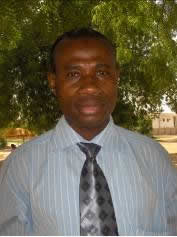Stories From the Field
Global Foodborne Infections Network strengthens foodborne disease outbreak detection and response

Dr. Raufu Ibrahim, a highly trained Salmonella researcher in Nigeria
Note: WHO's Global Salm-Surv is now the Global Foodborne Infections Network.
Frustrated by a lack of adequate laboratory supplies and dated laboratory facilities, Dr. Raufu Ibrahim, a highly trained Salmonella researcher in Maiduguri, Nigeria, was unable to confirm his suspicion about a new strain of Salmonella. Undeterred, Dr. Ibrahim contacted several international reference laboratories for assistance and received a response from Rene Hendriksen, a steering committee member of WHO Global Salm-Surv. WHO Global Salm-Surv is an international network of institutions and individuals committed to enhancing the capacity of national ministries of health and agriculture and national reference laboratories to detect, respond and prevent foodborne and other infectious, enteric diseases.
WHO, CDC, and the Danish Institute for Food and Veterinary Research founded WHO Global Salm-Surv in January 2000 in response to the heavy burden and public health importance of foodborne disease, particularly Salmonella, and the need to enhance capacity for laboratory-based surveillance in many countries. Today, the program has close to 1,100 members from 153 WHO Member States and provides training for other pathogens in addition to Salmonella such as Shigella, Vibrio cholerae, E. coli O157, and Campylobacter. CDC is a Steering Committee Partner and contributor of scientific expertise.
WHO Global Salm-Surv promotes the integration of foodborne disease surveillance with appropriate laboratory diagnostic practices and fosters a multidisciplinary approach among human health, veterinary, and food-related disciplines. The network supports international training courses, the global Salmonella country databank with data from more than 380 institutions worldwide, the external quality assurance system, the electronic discussion group to facilitate communication among members, and reference testing services. Since its inception, WHO Global Salm-Surv has brought together microbiologists and epidemiologists from more than 130 countries at 57 training courses at 15 regional sites.
With support from WHO Global Salm-Surv, Dr. Ibrahim was able to identify in his laboratory a new type of Salmonella—Salmonella serotype Hiddudify. Further investigation showed that Salmonella Hiduddify is prevalent in Nigerian chickens and in the local environment. Because of the threat to the health of Nigerians and possible negative effects on the national economy, Dr. Ibrahim is keen to learn more so that Nigeria can be better prepared in the event of an outbreak.
Dr. Fred Angulo, a CDC expert in enteric disease epidemiology, is enthusiastic about the mutually beneficial aspects of the program. "WHO Global Salm-Surv helps nations better detect and respond to foodborne disease and work together; it has [also] facilitated several new partnerships that allow CDC to better perform our public health mission."
For the original story and more information, see CDC Global Health E-Brief [PDF - 7 pages].
Contact Us:
- Centers for Disease Control and Prevention
1600 Clifton Rd
Atlanta, GA 30333 - 800-CDC-INFO
(800-232-4636)
TTY: (888) 232-6348
24 Hours/Every Day - cdcinfo@cdc.gov


